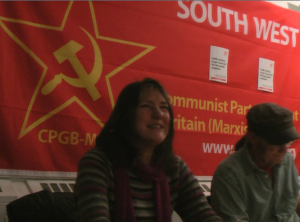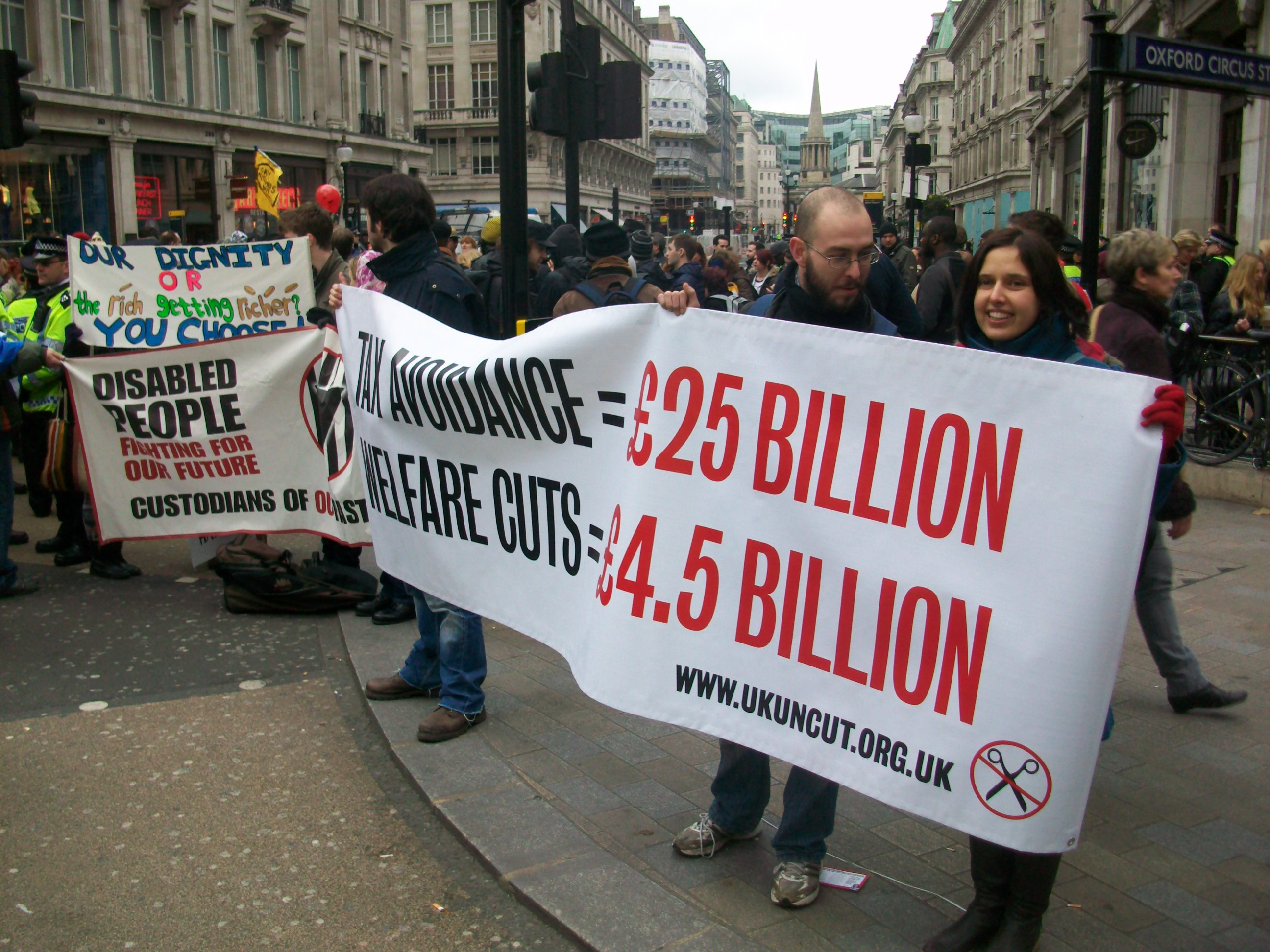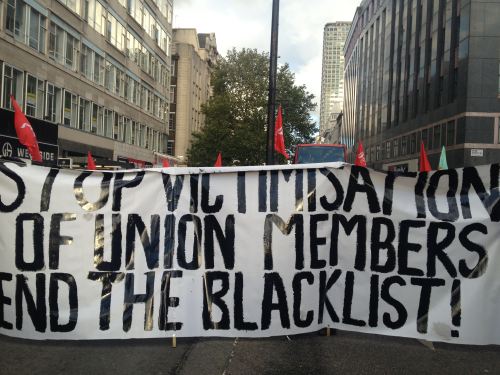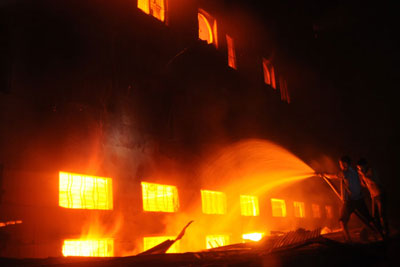Spiritless ’45

The true spirit of '45: A Soviet soldier hoists the red flag over the Reichstag in Berlin, marking the complete defeat of Nazi fascism.
There are some good bits in Spirit of ’45, the new film from Ken Loach. Some of the interviews and archive footage about working-class life in the 1930s are a poignant and timely reminder of the social horrors inflicted by capitalism in the throes of a global overproduction crisis – right down to the vermin-infested blankets and deadly absence of health care.
And the juxtaposition of such cruel personal reminiscence with the end-of-war scenes of jubilation and hope from 1945 could have set the context for a much more interesting film, taking a fresh look at the birth (and premature death) of the welfare state.
Instead, we are offered yet another panegyric on the supposed achievements of ‘old’ Labour ‘heroes’ like Clement Attlee and Herbert Morrison.
Not a word is said about the imperialist superprofits upon which the ruling class crucially depended to subsidise these temporary and partial concessions to the working class.
Not a word is said about the poisonous pro-imperialist policy of the Labour government, hell-bent on preserving those same superprofits, no matter what the cost to the hundreds of millions of people locked in colonial bondage around the world.
Most glaring omission of all: not a word is said about the popular levels of enthusiasm aroused by the heroic exploits of the Red Army in putting fascism to the sword and in defending its own, infinitely superior version of a state that put the welfare of workers at the top of every agenda.
It was that threat of a good revolutionary example set by the Soviet Union that emboldened workers to demand “no return to the ’30s”. And it was the special role of Labour imperialism to help deliver a ‘welfare state’ – a pale capitalist imitation of the Soviet original – in such a way as would simultaneously tie the working class to the colonial agenda of monopoly capital and clear the way for the post-war reversion to anti-communist red-baiting (on a script written by Orwell, another of Loach’s ‘heroes’).
All of this is a closed book for the filmmaker.
Starved of any international context, the film stumbles on impressionistically, locked always behind the little-British narrowness that remains the trademark everywhere of ‘left’ social democracy.
After airing some woolly criticisms of the earlier shortcomings of the reforms (same old managers at the National Coal Board, failure to nationalise all transport), the film hastens on to the sudden arrival of the Bad Fairy, Thatcher, and her (unexplained and apparently personal) crusade to smash everything up.
Just one of the film’s talking heads makes a single brief reference to the overproduction crisis, but beyond that there is no attempt to explain what was fuelling the assault upon workers’ conditions and rights. In fact, having finished its history-hopping journey from the ’30s through ’45 to the advent of Thatcherism, nothing remains but to open the screen to a few soundbites from some pale anti-communist ‘left’ luminaries like Tony Benn, John Rees and Alex Gordon, before the film finally runs out of steam and the credits roll.
As the deepest ever overproduction crisis is pushing Britain’s ruling class to accelerate its dismantlement of the welfare state, Spirit of ’45 is an opportunity missed to examine not only what brought Britain’s hard-bitten imperialist rulers to make such serious concessions to workers in the first place, but also why those concessions were only ever going to be temporary while the capitalist system remained in place.
These are questions whose answers are urgently needed to permeate the workers’ movement if we are going to be successful in breaking out of the downward spiral of imperialist poverty, crisis and war. Lasting rights for workers will not be won by going back to the ‘good old’ reformist dreams of ’45 – days that inevitably led to where we are today – but by smashing the capitalist system and going forward to build socialism.
Hugo Chavez memorial meeting held in Bristol
Another successful meeting was held in Bristol, in a series of such meetings hosted by CPGB-ML across the country to mark the great contribution Comrade Chavez has made to the progressive movement. The meeting, held on Thursday 14 March, attracted a range of people including some from Poland and Spain as well as local Bristol residents.
The local organiser of Cuba Solidarity Campaign, Yvonne, spoke first recounting the solidarity and camaraderie between Cuba and Venezuela and also personally between Fidel and Chavez. Yvonne echoed the sadness that had been felt in Cuba at the loss of Chavez at such a young age and remarked that it had only been a couple of years ago that Fidel was fighting illness and Chavez had been the one to visit his hospital bedside.
She also highlighted the benefits that had been brought to the region through the creation of ALBA, the Bolivarian Alternative for Latin America and the Caribbean, and CELAC, the Community of Latin American and Caribbean States.
Following Yvonne’s contribution, Comrade Giles of the CPGB-ML gave a well-informed speech explaining the context that lead to Chavez getting elected in 1998, the attempted coup against him in 2002 and the development and achievements of the Bolivarian revolution, with statistics and commentary about how the lives of the majority of Venezuelans have been positively affected.
Giles also showed Chavez’s international solidarity and his courage in standing firm in support of the countries who are defending their sovereignty against the might of imperialism. Giles spoke of Chavez’s support for Ahmadinejad in Iran, Mugabe in Zimbabwe, Al Assad in Syria, and Gaddafi in Libya, all of which typified his determination to stand on the side of the oppressed.
A lively discussion followed the presentation with additional comments made about how the media is used to create a false impression of these leaders. An example from Spain was of the paper El Pais constantly referring to Chavez as a dictator and carrying misinformation about the advances made in Venezuela. It was agreed that this the same as happens in the newspapers in Britain and is done deliberately to try and deflect peoples’ attention away from the idea that there is an alternative to capitalism.
The conclusion of the meeting gave its full support to Venezuelan government as it stands firm to defends the gains that have been made over the last 14 years. Imperialism will no doubt be working hard to attempt to roll back these achievements and will use any trick it can to get back control of the wealth of Venezuela. It is therefore our internationalist duty to stand strong and vigilant in opposing any such attempts by imperialism.
Just as Comrade Hugo Chavez was a staunch defender of those who stood on the axis of resistance in the face of imperialist hegemony, we must learn from this great example and also stand firm in solidarity with our comrades, brothers and sisters in Venezuela.
A final red salute to our comrade Hugo Chavez.
Hasta la Victoria Siempre!
Bristol CPGB-ML will be hosting another public meeting Fighting for communism: the future that works! on Thursday 4 April, 7.30pm at Hamilton House, 80 Stokes Croft, Bristol BS1 3QY. The meeting will be a short film showing followed by discussion. All are welcome, we hope to see some more new faces.
For more details click here: http://www.cpgb-ml.org/index.php?secName=events
Condolences to the Venezuelan people
To: Comrade Nicolás Maduro
To: The leadership of the United Socialist Party of Venezuela (PSUV)
To: The people of Venezuela
Dear Comrades
It was with feelings of deep and inconsolable grief that we learned the news that Comrade Hugo Rafael Chávez Frías, the respected and beloved leader of the Venezuelan revolution and the Venezuelan people and the true friend and comrade-in-arms of working and oppressed people everywhere, passed away after a long and tenacious battle against illness.
Please accept our most heartfelt condolences, which we offer to Comrade Chávez’s comrades, his family and loved ones and to all the Venezuelan people who are standing in their place, defending the gains of the revolution that Commandante Chávez has led with such distinction.
Comrade Chávez will be remembered forever as a towering figure in humanity’s fight for liberation. Thanks to him, millions of his compatriots were lifted out of poverty and were accorded their human dignity for the first time in history. Moreover, he proclaimed the goal of building a socialist society and set out on the road to achieve that.
Comrade Chávez was also a thoroughgoing internationalist. He stood in the vanguard of the struggle to win national liberation and social progress for the whole of Latin America and the Caribbean and through his leadership of such bodies as ALBA and Petrocaribe turned what had long been the strategic backyard of US imperialism into a beacon of hope for a new world free of imperialism.
A tireless fighter, he extended his utmost support to every country and every people fighting against US imperialism and its lackeys and for national liberation, social progress and socialism.
Comrade Chávez was a supremely brave individual. Imprisonment or the threat of death could not deter him. Indeed, he turned them into political weapons to advance the struggle. From the time when he was first diagnosed with cancer, he waged that final battle with the same bravery, determination and resilience with which he lived his entire life.
Comrade Chávez has left us too soon. He had so much more to give. But like all great revolutionary leaders he is more than an individual. As Comrade Evo Morales has said, at this moment Hugo Chávez is more alive than ever and he will always be with us.
The revolutionary people of Venezuela are the great people brought up by Commandante Chávez! We are confident that they will continue the struggle he led and will march forward towards the bright socialist future.
Comrades, at this moment in particular, we want to assure of our full support and solidarity for the Venezuelan revolution and your anti-imperialist struggle for socialism. All our sympathies are with you.
ETERNAL GLORY TO COMRADE HUGO RAFAEL CHÁVEZ FRIAS!
CPGB-ML, 7 March 2013
Venezuelan communists on the death of Commandante Chávez
Statement of the PCMLV on the death of Commandante Chávez
The Marxist-Leninist Communist Party of Venezuela, PCMLV, expresses its grief and solidarity at the physical loss of Commandante President Hugo Chávez Frias to all the workers, peasants, students, women’s organisations, revolutionary, anti-imperialist, socialist and Bolivarian parties and organisations of the masses.
We also express our condolences to all his family, friends and to the national government for the loss of a great humanist, a patriotic, progressive and consistent revolutionary statesman, as President Hugo Chávez proved to be until the last days of his existence.
We call on the working class, which knows how to rise to the challenge in the revolutionary struggle in the most pressing moments of history, to prepare to resist and defeat the reactionaries who will not hesitate to take advantage of this difficult time to thwart through violent means the gains and demands that we have achieved under the leadership of President Chávez. Imperialism will set stronger traps at this sorrowful moment that the national-revolutionary movement is going through.
The call is to not renounce the struggle to build socialism, the banner that President Hugo Chávez raised in all circumstances; this banner needs to be taken up rigorously and courageously by all the workers of this nation in this difficult moment in history. We, as party of the working class in Venezuela, make the call for the struggle and building of socialism and communism from the scientific conception of
Marxism Leninism.
The acts of sabotage, of hired killers, the terrorism, food shortages, the propaganda of disinformation, anxiety and manipulation will intensify. The national and international reactionaries feel victorious at this time, but the national and world working class will go forward with the necessary and strategic battles to continue the path of victory and the accumulation of forces to confront the fascists and imperialists.
The death of the President of the Republic must not mean the decline in popular organisation, but rather it must serve as an impetus for future struggles against the class enemy. We must not believe in the phony condolences of the local right wing, which on dozens of occasions tried to assassinate the commandante. These sectors are moved by a single impulse: profit at any cost whatever.
The right wing is evaluating what actions to take in the coming days. It is no coincidence that the Venezuelan government expelled two US military attaches for conspiratorial work.
We strongly call on all the revolutionary elements to close ranks against the capitalist and imperialist enemy. The working class must be prepared for a possible difficult situation; it must not trust the bourgeois enemy that has historically proven to be traitorous. If the pro-imperialist bourgeoisie tries to take advantage of this hard time of grief of the humble and exploited masses, the masses should respond forcefully and applying revolutionary violence.
Socialism can only be built with the worker-peasant alliance in power and the people in arms!
PCMLV
Caracas, 5 March 2013
Horse meat and revolution
If there’s one thing the horse meat scandal shows, it’s that we can’t trust capitalists to produce our food. The food industry is just that – an industry. Under conditions of capitalism, every food company will look for market advantage and ways to cut corners and gain consumers.
The fact that our food is what keeps us alive, and is also what determines to a large extent the quality and length of our lives, is and always has been totally irrelevant to the corporate executives who direct the majority of the world’s food production.
Food contamination was rife in the 19th century (chalk in the flour; dust in the tea; cat and rat in the beef mince) – the poorer you were, the more likely it was that your food was contaminated. Modern marketing and packaging has given us the impression that all that was in the past, when in fact it has been raised to a fine art and made more endemic and systematic.
Business is business, and MAXIMISING PROFIT is what determines all practice – in food production as in any other industry.
But surely it is obvious to anyone who cares to think about it that food is too important to be produced according to such motivations. Health and vitality, mood and perception, even clarity of thought can be affected by the general state of your physical health – which is fundamentally determined by the fuel you put into your body.
To take a single example: if you consistently consume hydrogenated fats instead of the omega oils your brain needs to build cells, your body will try to build a brain out of those instead. But don’t expect it to be a brain that functions well!
Many diseases and conditions that we used to think of as ‘mental’ are turning out to have physical and dietary roots. Alzheimer’s is now being referred to by some scientists as ‘type 3 diabetes‘. ADHD, which affects a growing number of children, is most likely a result of exposure to a cocktail of environmental and food-related toxins, as is much unexplained infertility and any number of other complaints.
That old saying ‘you are what you eat‘ is turning out to be far more true than we ever realised.
Meanwhile, the food companies are employing scientists whose job it is to make sure we are addicted to the crap that is destroying our brains and our bodies – encouraging us to ‘treat’ ourselves and our children to their poisonous rubbish.
As usual, it’s the working class that suffers the most. No amount of ‘education’ about food and health will change the fact that the cheapest and easiest way to feed your family is on this rubbish.
Decent food will not arrive as a result of consumer choices by the few who are lucky enough to make them, but as a result of workers kicking out the capitalists and taking charge of food production in the interests of all.
Labour sabotage in Harlow
This article is part of the industrial report that was presented at the 9 February meeting of the CPGB-ML central committee.
********************
Another illustration of the role played by Labour councillors in implementing so-called ‘ConDem’ cuts – actually capitalist cuts – is the behaviour of the local Labour group in Harlow.
Harlow Trades Council has long supported the work of Harlow Welfare Rights and Advice in its efforts to serve the often hard-pressed local community. Recognising the clear need for the services provided by HWRA, Labour’s General Committee supported its retention before Christmas. What’s more, when the continued existence of the body was challenged on some dubious legal technicality the GC voted for a mediated solution that would not deprive the people of Harlow of this service.
Yet at 7.30pm on 28 January, Labour-run Harlow council abruptly changed the HWRA locks, banning staff from entry and at a stroke bringing its vital work in the local community to a halt.
Whilst this act of vandalism was initiated by a civil servant (the council’s chief executive Malcolm Morley), one very disgruntled Labour councillor noted that “It is clear from my discussion with members of Labour’s cabinet that the leader and a majority of the cabinet are in agreement with the officers. Most notable for their full and active support of Malcolm Morley are leader Mark Wilkinson and cabinet member Tony Durcan.”
The yawning gap between Labour’s words and its deeds prompted the councillor to reflect: “I am very disappointed that councillors don’t have much of a say in running the council. The reason I became a councillor is to help people in Harlow, but so far I have not seen any changes apart from what the government want us to implement.”
The secretary of Harlow Trades Council, David Forman, has drawn some interesting conclusions from this experience, noting that “Labour councillors hide behind the law like a matador hides behind his red cloak, which merely conceals the tools of destruction.
“A failure to understand the class-based nature of the state, with the law and judiciary being key weapons in the armoury of the ruling class, leads those on the right and centre ground to see the state as neutral and benign.
“A deliberate rewriting of history … allows the labour movement to be lulled into thinking fine oratory and legal manoeuvres by the middle classes produces reforms. In reality, it is a series of struggles on the industrial front by a militant working class that leads to changes on the political front.
“All this obfuscation is designed to disarm the working class and make them dependent on their so-called ‘betters’, thus allowing Labour and reformist union leaders to spout the worn-out phrase: ‘There is no alternative’.”
It is indeed social democracy (including its ‘left’ face) that blunts the edge of class struggle and conceals from workers the only real alternative: socialism.
Blacklists: still hitting the fan
This article is part of the industrial report that was presented at the 9 February meeting of the CPGB-ML central committee.
Three years on from the half-hearted raid on Ian Kerr’s ‘Consulting Association’ blacklisting scam and his conviction on data protection offences, the scandal is refusing to go away. (See Proletarian, December 2012)
Instead, thanks to the efforts of the Blacklist Support Group and workers fighting for redress both in the High Court and in the European Court of Human Justice, more and more is coming to light about the blanket surveillance of workers – in the construction industry and elsewhere.
It turns out that the CA blacklist was used for high-end government projects including the Olympics, the MOD, Portcullis House and the Jubilee Line, and speculation is mounting that blacklists were used in recruiting for Crossrail.
Whilst the range of building companies involved in snooping extends to just about every major operator, pride of place in this rogue’s gallery has gone to McAlpine, run by family scion Callum. He acted as chairman of the CA between 1993 and 1996, and all CA meetings took place at his office.
Under scrutiny by the Scottish Affairs Committee, McAlpine pleaded ignorance or a poor memory, but confessed to heavy use of the blacklist throughout 2008, ‘excusing’ himself on the plea that he was chasing ‘illegal’ immigrants, not union militants! Just how much there was to cover up became clear given the circumstances surrounding the company’s action in paying off Kerr’s £5,000 fine, his legal expenses and the redundancy pay-outs to CA’s staff.
Whilst Callum McAlpine got out the violin, claiming that the pay-off was a “humanitarian and reasonable action”, everything was done at the time to conceal the cosy McAlpine connection. McAlpine’s head of human resources, David Cochrane, himself acting as the last chairman of the CA, warned Kerr to hide the hush money in his daughter’s bank account.
As Kerr told the Scottish Affairs Committee in November, shortly before his death: “I had put myself at the front and took the flak … so that they wouldn’t be drawn into all of this. They would remain hidden.”
Now that Labour is out of the driving seat, there is much sound and fury to be heard at Westminster, with indignant opposition benches deploring the refusal of the ConDem government to take the blacklisting scandal seriously. It will be recalled, however, that Labour had the opportunity in 2009, when the scandal broke, to deal with the issue.
Indeed, Mandelson put an amendment to the Employment Relations Act through in 2010, supposedly fixing things. Yet it rapidly became clear that nothing had really changed. As the law stands, blacklisting as such is still neither unlawful nor a criminal act.
To get redress, it is necessary for the blacklisted worker not only to prove that he has been blacklisted, but also that his inclusion on that blacklist is the sole reason he is turned down for a job – a well-nigh impossible task, especially given the legal resources commanded by the companies.
And in any case, how can you seek redress if you don’t know you are on a blacklist in the first place? As of autumn 2012, only 194 of the 3,213 workers known by the Information Commissioner’s Office to have been blacklisted are aware of the fact. Nor is this surprising, since you can only find out if you are on a blacklist by phoning up the ICO and asking them.
Some might not unreasonably fear that asking the question is itself asking for trouble.
Labour in government had ample opportunity to ban blacklists in 2009. It failed to do so for the same reason as every other Labour government in history: because Labour is just as much a servant of the bourgeoisie as are the Tories against whom it rails.
Surveillance of workers did not begin with Kerr’s racket. The Consulting Association began its career in 1993 by paying £10,000 for an already-existing database of blacklisted names. The source of that database was the Economic League, of which Kerr was himself an employee.
The League was founded in 1919 to root out communist and left-wing organisations and individuals. Working closely with the British Empire Union fascists, it played a key role in attacking the general strike in 1926. Its founder had led the Naval Intelligence Division of the Admiralty through the first world war, and the chairman of the BBC sat on its council.
Through the 1960s, 70s and 80s, the League ran a comprehensive blacklisting service. Despite being regularly exposed in the press of the time, it seemed to enjoy a charmed existence, until the heat from a parliamentary inquiry in 1990 finally obliged the company to formally dissolve itself – only for its work to be taken up again by Sir Robert McAlpine and the Consulting Association.
The bourgeoisie can have every confidence that Kerr’s work will now be taken up again by other hands working to an identical agenda – until such time that the workers’ movement frees itself from the suffocating Labour embrace and takes meaningful action to stop it.
Just how corrupting an effect social democracy has upon the trade-union movement is clear from the evidence now emerging of collusion between some unions and the Consulting Association.
According to Construction News: “Evidence has emerged that suggests union representatives may have ‘liaised’ with contractors to blacklist workers from construction jobs. But an investigation by Construction News has uncovered documents that suggest union officials may also have provided information to the blacklist.
“One of the files from the blacklist, seen by CN, describes a worker, Michael Anderson, as ‘not recommended’ by Amicus … Mr Anderson’s redacted file says: ‘1997–1999. Worked at JLE [Jubilee Line Extension] during electricians’ dispute but not involved in any actions. 2005 Oct 26: Information received … that the above is ‘not recommended’ by Amicus.’ It adds: ‘Above information came from [redacted] of Amicus.’”
Mr Anderson’s summing up is damning: “I am an ordinary spark. I have spent long periods in unemployment. It is not just financial. It is everything.”
This echoes the testimony of another blacklisted electrician, Steve Acheson, the leader of the EPIU’s Manchester branch. Confronted with evidence related to union involvement in the collection of blacklist data, he told Construction News: “I have been a union member my whole life. It is a very hard decision whether to sue. But I have worked just two years in the last 12. Knowing that part of the reason is because of union involvement is very difficult to take.”
The January 2013 edition of Site Worker had this to say: “When it came to light, after the Information Commissioner’s Office exposed the Consulting Association’s construction blacklist in 2009, that some Unite and Ucatt officials had allegedly been supplying information about rank-and-file union members directly to the CA, a new trade-union low had been reached …
“Unite and Ucatt are disgustingly and disgracefully trying to cover up the conduct of these officials and to sweep this under the carpet. It has been reported that, in 2006, the then general secretary of Unite, Derek Simpson may well have known about the CA and its activities yet did not act.”
Cleaning up the unions must begin by breaking the link with Labour.
Death by a thousand cuts
This article is part of the industrial report that was presented at the 12 January meeting of the CPGB-ML central committee.
The announcement of an across-the-board 1 percent cap on benefit rises is the latest salvo in a capitalist offensive against the working class.
By pretending to champion the ‘workers against the shirkers’ (ie, the employed versus the jobless), the government hopes to divide and undermine the working class. Labour’s feeble response, pointing out that the benefit cut will hit low-pay working households dependent on tax credits too, merely ropes off another section of the working class (‘strivers’, a 21st-century version of the ‘deserving poor’), further reinforcing the debilitating notion that some capitalist cuts are ‘fairer’ than others.
Meanwhile, the salami slicer grinds on relentlessly in every borough, regardless of which party is turning the handle.
Birmingham city council intends to cut £600m from the £1.2bn budgets under its control. More than a thousand council workers have already been made redundant, with another 1,000 to follow this year, and council leaders predict that by 2017, 7,000 jobs will have gone.
The leader of the Labour group on the council refused demands that the council should defy central government and pass a ‘deficit budget’, instead announcing “the end of local government as we know it”, entailing some services being completely wound up and others pared to the bone – eg, fortnightly or monthly rubbish collections.
In their account of this meeting, Birmingham Against Cuts reported that “One young person from Handsworth who was there with the Save Birmingham Youth Service campaign talked passionately about how his youth worker had helped him, and without the youth service (which faces further cuts this year) he would probably be following a life of crime. He said he could see another riot and asked ‘Do you really think you can handle what will happen if you cut youth services?’”
Or, as the head of the International Committee of the Red Cross, Yves Daccord, puts it in a wider context: “If the economic pressure on people goes on, yes it will have a social impact on people. And if young people especially don’t see any future, any options, you might be confronted also with unrest – like in 2011 – and there is no reason that this unrest will not repeat itself one day.” Daccord went on to draw a parallel with the uprisings in Tunisia and Egypt.
Even if the council in Birmingham relents over youth service funding under this kind of pressure, this will only mean £1m being taken out of another budget, raising the economic and social pressure somewhere else. Something has to give.
See also: ‘Who stole our future?‘
Corporate murder in Bangladesh
This article is part of the industrial report that was presented at the 12 January meeting of the CPGB-ML central committee.
The exploitation of proletarians in Bangladesh, helping deliver the superprofits into which imperialism dips to buy off the labour aristocracy at home, is conducted in a more straightforwardly murderous fashion.
Documents and logos retrieved from the factory blaze that killed 112 garment workers and injured many more indicated that the sweatshop death trap was producing clothes for Walmart’s ‘Faded Glory’ line, as well as for other US and foreign companies.
November’s fire at the nine-storey Tazreen factory in Savar, north west of Dhaka, started in a warehouse on the ground floor that was used to store yarn, and quickly spread to the upper floors. Though most workers had left for the day when the fire started, 600 were still inside working overtime, and it was these who were trapped.
About a hundred died inside the building and another dozen lost their lives trying to escape from the upper storeys. One survivor, Mohammad Ripu, tried to run out of the building when the fire alarm rang but was stopped by managers, who said: “Nothing happened. The fire alarm had just gone out of order. Go back to work.” When people ran for the exit door they found it had been locked from the outside.
Tazreen was not a one-off tragedy. Since 2005, around 700, mostly female, garment workers have perished in similar fires, revealing a systematic flouting of safety rules that amounts to a policy of calculated manslaughter.
These corporate murders, blamed on local sweatshop bosses but carried out to feed monopoly capital’s insatiable hunger for cheap labour, are inseparable from the intense superexploitation that is essential to the country’s annual export of $18bn worth of garments.
Workers are fighting back courageously against this oppression, organising strikes to demand better wages and conditions. One union leader was found tortured and killed outside Dhaka last year, but the struggle will only intensify.









